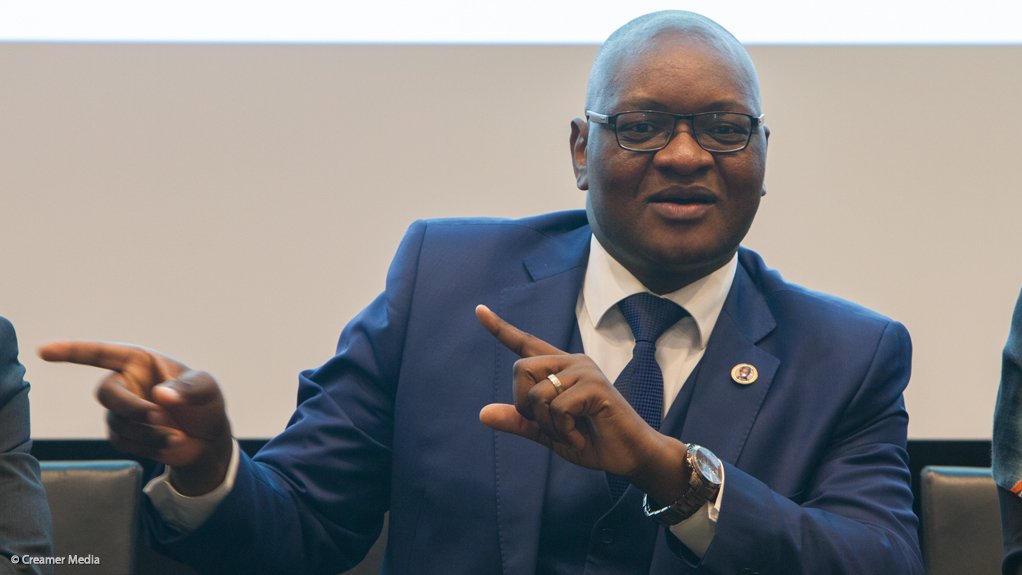A little over a year after first taking office, Gauteng Premier David Makhura has reiterated his commitment to his administration’s transformation, modernisation and reindustrialisation (TMR) agenda, telling the Provincial Legislature on Thursday that focus would now shift to the implementation of the TMR strategy and ensuring accountability from each of the province’s departments and agencies.
“Our vision is to build the Gauteng City region (GCR) as a seamlessly integrated, socially cohesive, economically inclusive city-region . . . [with an] accountable, responsive, transparent and clean government as well as an active citizenry.
“Naturally, our focus must now shift to implementation, execution, accountability and performance on the TMR priorities. MECs, Mayors and departmental and municipal officials must be and shall be held accountable on their performance,” he noted during his Budget Vote speech for the 2015/16 financial year.
Makhura further emphasised “the absolute necessity” for greater coordination and integration across the GCR, referring specifically to a new intergovernmental relations and planning framework in the province.
The Office of the Premier would, in the coming months, table proposed legislation that would formalise the GCR cooperative governance structures, which were currently largely voluntary and informal, he said.
Noting that his office had spent the last 12 months completing the alignment of all sectoral, departmental and municipal five-year strategic plans with the programmes and priorities of the TMR, Makhura committed the province to scaling-up its interventions around the roll-out of infrastructure that catalysed social and economic development.
Gauteng was, he advanced, working with national government, State-owned enterprises, municipalities and the private sector to drive the province’s ambitious infrastructure investment plans – largely centered on the development of “mega” human settlements and key economic corridors.
Meanwhile, to oversee the implementation of the Gauteng Infrastructure Master Plan and Spatial Development Framework, the Premier had also established the Gauteng Infrastructure Coordinating Committee, which would be finalised at the GCR Development Planning Conference in October.
His administration had also established several steering committees focusing on energy security, water and sanitation, e-governance and broadband, transport and the aerotropolis.
The province’s Service Delivery War Room was now also operational across the provincial and local government level and had “significantly” improved the government’s response time to issues raised by communities, asserted Makhura.
CRITICAL INVESTMENT
Describing investment in Gauteng’s infrastructure programme as “critical” to its future, Makhura announced on Thursday that the GCR would host the inaugural Gauteng Infrastructure Investment Conference on July 16 and 17, which would be attended by national, provincial and local government leaders, as well as international and local investors.
“The aim of the conference will be to expose investors to the huge investment opportunities with regard to the infrastructure needs of our province in the areas of energy and acid mine drainage, public transport and aerotropolis development, human settlements and post-apartheid cities, inner-city regeneration, information communication technology and broadband roll-out,” he commented.
In terms of energy, following the conference, the Premier would, together with the City of Joburg and the City of Tshwane, make “major announcements” on the future of the province’s coal-fired stations and solar rooftop panel roll-out plan.
“We are confident that this will send a clear message that we are taking steps to keep the lights on and power the economy of our province,” he remarked.
TRANSPARENCY TREND
The Premier further committed to strengthening interventions aimed at improving transparency and preventing corruption, telling the legislature that the provincial administration aimed to achieve full disclosure of the financial interests of its senior management members.
“Linked to this is the adoption of the GCR Anti-Corruption Strategy [through which we are] strengthening the capacity to investigate and prevent acts of corruption, particularly in departments that have a record of high incidents of corruption in our province,” he commented.
The departments of Roads and Transport, Infrastructure Development, Human Settlements, Community Safety, Education and Economic Development had exhibited a record of “high incidents” of corruption in the past, and would be particularly targeted under this strategy.
In addition to the roll-out of the open tender system and the introduction of so-called “integrity champions” in high-risk departments, the Gauteng government further planned to launch several anticorruption campaigns with municipalities, civil society and law enforcement agencies.
“We are determined to build a highly motivated team of administrators who are accountable and empowered to play and fulfil their role without political interference,” he said.
DEMOCRATIC DISPENSATION
Makhura took the opportunity on Thursday to again encourage road users to comply with the new e-toll dispensation, but noted that any concerns around the new system could be taken up with the province.
“We urge motorists and the people of Gauteng to support the new dispensation and pay their tariffs. Any concerns on the new dispensation will be addressed if they are raised with us. Problems of democracy must be addressed through more democracy, not anarchy and lawlessness,” he appealed.
He further rubbished speculation that he planned a Cabinet reshuffle, describing his MECs as “visible, proactive and responsive”.
EMAIL THIS ARTICLE SAVE THIS ARTICLE
To subscribe email subscriptions@creamermedia.co.za or click here
To advertise email advertising@creamermedia.co.za or click here











